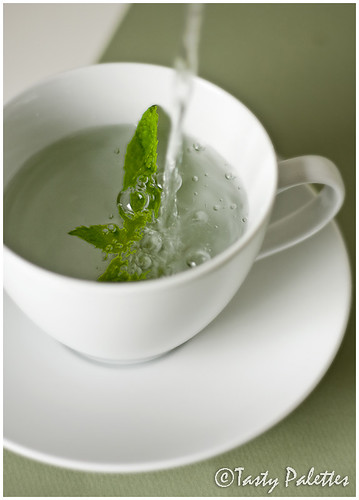Herbs: More Than Just A Garnish
Wednesday, May 14, 2008
Posted by Suganya
Herbs have been sought after for their colour, texture and flavour from time unknown. Snipped as garnish, they brighten even the simplest of foods. But herbs are more than just a garnish. Understanding the power of these plants, Indian Ayurvedha, ancient Chinese and Greek medicine have ingeniously used them as medicines for centuries.
Knowingly or unknowingly, common herbs that we use in our everyday cooking have many beneficial properties. Given below are some of the medicinal properties of these unassuming plants.
Basil - Aids digestion. Used to treat digestive ailments, headaches and anxiety. Basil oil has anti-oxidant properties.
Bay - Heals rheumatism, relieves flatulence. Bay oil is used externally for bruises, sprains and skin rashes. Has bactericidal and fungicidal properties.
Cardamom - Digestive aid and stimulant.
Cayenne Pepper - Used for treating sore throat, stomach aches and cramps.
Cinnamon - Has antiseptic and antioxidant properties. Aids digestion and relieves vomiting.
Cloves - Temporary toothache analgesic. Diluted clove oil is used on wounds, cuts and infections for its antiseptic properties.
Coriander - Calms irritating effects on the stomach that certain medicines produce. Seeds soothe upset stomach and aids digestion.
Garlic - Used as a treatment for intestinal worms and parasites. Allicin, the component that gives the strong odor, inhibits various bacteria, fungi and yeast. Has beneficial effects in the treatment of high blood pressure and gastric cancer.
Ginger - Treats indigestion and motion sickness.
Horseradish - A diuretic, used to treat certain kidney conditions.
Lavender - Leaves repel insects. Lavender oil has antiseptic and anti-inflammatory properties. Aids sleep and relaxation.
Mint - Calms upset stomach and menstrual cramps. Excellent carminative and gastric stimulant. The menthol in peppermint stimulates the flow of bile to the stomach and hence digestion.
Oregano - Leaf infusions are used to treat indigestion, cough, headache and to promote menstruation. Oregano oil is used as a toothache remedy.
Parsley - A good source of vitamins A, B, C, E, K, calcium and iron.
Rosemary - Stimulates circulation of blood, increasing memory and concentration. Eases migraines and headaches. Rosemary oil is applied externally on sores, bruises and wounds.
Sage - Sage oil has astringent, antiseptic and irritant properties; hence used for treating sore throats, mouth sores and mouth ulcers.
Thyme - Has antiseptic and antifungal properties. Used in cough medicines and mouthwashes. Soothes gastrointestinal discomforts.
Herbs have other uses in a household.
- Aromatic herb infused oils can be prepared at home effortlessly.
- Herbal teas, known as tisanes, can provide a helpful supplement to the daily diet.
- Treasured for their fragrance, herbs like lavender, lemon verbena and rosemary are used in room sprays, potpourri and fabric fresheners.
- A warm bath with herbs like lavender, chamomile, mint and rosemary has soothing effects.
- Wild animals turn to herbs if they are feeling unwell. Likewise, domesticated animals can also be benefited from herbs for simple ailments.
So next time you look at a herb, take a moment to appreciate its goodness. There is more to it than meets the eye.
Note: This post is intended as a reference only. Consult with your physician before attempting self-treatment.
Reference: Rodale’s Illustrated Encyclopedia of Herbs
Are you interested in contributing to The Daily Tiffin? Drop us an email: blogmeeta@gmail.com. We look forward to hearing your ideas.
This Post was written by Suganya from Tasty Palettes.











A great overview! I'm now thinking about the herbs in my garden in a different way. Thank you.